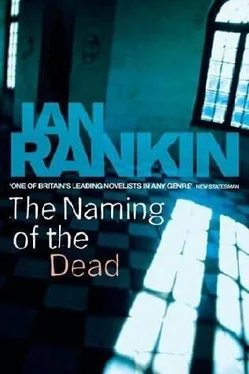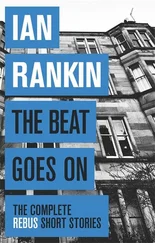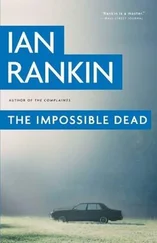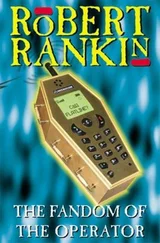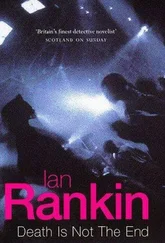“Sorry, is this seat taken?”
Siobhan shook her head and the man squeezed in beside her.
“Wasn’t yesterday terrible?” he said. Siobhan grunted a reply, but the woman across the table said she’d been shopping in Rose Street and had only just escaped being caught up in it. The two then started trading war stories, while Siobhan stared out the window again. The skirmishes had been just that. Police tactics had been unchanged: go in hard; let them know the city’s ours, not theirs. From the footage, there’d been obvious provocation. But they’d been forewarned-no point in joining a demonstration if it didn’t make the news. Anarchists couldn’t afford ad campaigns. Baton charges were their equivalent of free publicity. The photos in the paper proved it: cops with gritted teeth swinging their clubs; rioters defenseless on the ground, being dragged away by faceless uniforms. All very George Orwell. None of it got Siobhan any closer to finding out who had attacked her mother, or why.
But she wasn’t about to give up.
Her eyes stung when she blinked, and every few blinks the world seemed to swim out of focus. She needed sleep but was wired on caffeine and sugar.
“Sorry, but are you all right?”
It was her neighbor again. His hand was brushing her arm. When she blinked her eyes open, she could feel the single tear running down her cheek. She wiped it away.
“I’m fine,” she said. “Just a bit tired.”
“Thought maybe we’d upset you,” the woman across the table was saying, “going on about yesterday…”
Siobhan shook her head, saw that the woman had finished with her paper. “Mind if I…?”
“No, pet, you go ahead.”
Siobhan managed a smile and opened the tabloid, studying the pictures, looking for the photographer’s name…
At Haymarket she lined up for a cab. Got out at the Western General and went straight to the ward. Her father was slurping tea in the reception area. He’d slept in his clothes and hadn’t managed a shave, the bristles gray on his cheeks and chin. He looked old to her, old and suddenly mortal.
“How is she?” Siobhan asked.
“Not too bad. Due to get the scan just before lunch. How about you?”
“Still haven’t found the bastard.”
“I meant, how are you feeling?”
“I’m all right.”
“You were up half the night, weren’t you?”
“Maybe a bit more than half,” she conceded with a smile. Her phone beeped: not a message, just warning her its battery was low. She switched it off. “Can I see her?”
“They’re getting her ready. Said they’d tell me when they’d finished. How’s the outside world?”
“Ready to face another day.”
“Can I buy you a coffee?”
She shook her head. “I’m swimming in the stuff.”
“I think you should get some rest, love. Come see her this afternoon, after the tests.”
“I’ll just say hello first.” She nodded toward the ward doors.
“Then you’ll go home?”
“Promise.”
The morning news: yesterday’s arrests were being sent to the sheriff court on Chambers Street. The court itself would be closed to the public. A protest was taking place outside the Dungavel Immigration Center. Forewarned, the immigration service had already moved the waiting deportees elsewhere. The demonstration would go ahead anyway, organizers said.
Trouble at the Peace Camp in Stirling. People were starting to head for Gleneagles, the police determined to stop them, using Section 60 powers to stop and search without suspicion. In Edinburgh, the cleanup was well advanced. A vehicle loaded with ninety gallons of cooking oil had been detained-the oil would have formed a road slick, causing traffic chaos. Wednesday’s Final Push concert at Murrayfield was coming together. The stage had been built, lighting installed. Midge Ure was hoping for some “decent Scottish summer weather.” Performers and celebrities had started arriving in the city. Richard Branson had flown one of his jets to Edinburgh. Prestwick Airport was gearing up for the next day’s arrivals. An advance guard of diplomats had already arrived. President Bush would be bringing his own sniffer dog, plus a mountain bike so he could maintain his daily exercise regime. Back in the newsroom, the TV presenter read out an e-mail from a viewer, suggesting the summit could have been held on one of the North Sea’s many decommissioned oil platforms, “saving a small fortune in security, and making protest marches an interesting proposition.”
Rebus finished his coffee and turned down the sound. Vans were arriving in the police station lot, ready to transport prisoners to the court. Ellen Wylie was due in around ninety minutes to make her statement. He’d tried Siobhan’s cell a couple of times but it went straight to messaging, meaning she’d switched it off. He’d called Sorbus HQ, only to be told she’d left for Edinburgh. Tried the Western General, but learned only that “Mrs. Clarke has had a comfortable night.” Number of times he’d heard that in his life…A comfortable night: meaning “She’s still alive, if that’s what’s worrying you.” He looked up and saw that a man had entered the CID room.
“Help you?” Rebus asked. Then he recognized the uniform. “Sorry, sir.”
“We’ve not met,” the chief constable said, holding out his hand. “I’m James Corbyn.”
Rebus returned the handshake, noting that Corbyn wasn’t a Freemason. “DI Rebus,” he said.
“Are you working with DS Clarke on the Auchterarder case?”
“That’s right, sir.”
“I’ve been trying to reach her. She owes me an update.”
“Some interesting developments, sir. There’s a Web site set up by a local couple. Might be how the killer chose his victims.”
“You’ve got names for all three?”
“Yes, sir. Same MO each time.”
“Could there be others?”
“No way of knowing.”
“Will he stop at three?”
“Again, sir, hard to tell.”
The chief constable was patrolling the room, inspecting wall charts, desks, computer monitors. “I told Clarke she had until tomorrow. After that, we shut the case down till the G8 is done and dusted.”
“I’m not sure that’s a good idea.”
“Media haven’t got hold of it yet. No reason we can’t sit on it for a few days.”
“Trails have a way of going cold, sir. If we give suspects that bit of extra time to get their stories straight…”
“You’ve got suspects?” Corbyn had turned toward Rebus.
“Not as such, sir, but there are people we’re talking to.”
“G8 has to take priority, Rebus.”
“Mind if I ask why, sir?”
Corbyn glared at him. “Because the world’s eight most powerful men are going to be in Scotland, staying at the country’s best hotel. That’s the story everyone wants. The fact that a serial killer is stalking the central belt might just get in the way, don’t you think?”
“Actually, sir, only one of the victims is from Scotland.”
The chief constable walked to within a few inches of Rebus. “Don’t try to be smart, DI Rebus. And don’t think I haven’t dealt with your kind before.”
“What kind is that, sir?”
“The kind that thinks because he’s been around awhile, he knows better than anyone else. You know what they say about cars-more miles on the clock, closer they are to being scrapped.”
“Thing is, sir, I prefer vintage cars to the stuff they’re churning out today. Shall I pass your message along to DS Clarke? I expect you’ve got better things to be doing with your time. Off to Gleneagles yourself at any point?”
“None of your bloody business.”
“Message received.” Rebus gave the chief constable something that could have been construed as a salute.
Читать дальше
